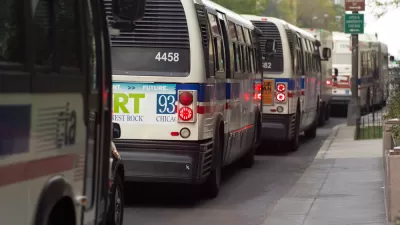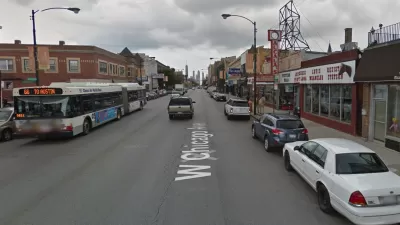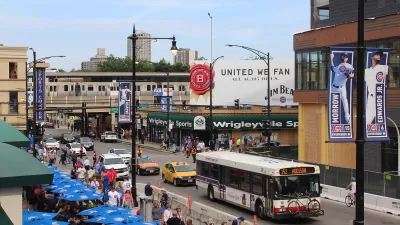Chicago's South Side got its 31st Street (number 31) bus back for some weekday service in 2016, but it's likely that service will be canceled again.
Without a spike in ridership or a new funding source, the 31st Street bus (number 31) will likely be canceled. A pilot program in 2016 brought back service on a limited basis from 10 am to 7 pm weekdays. "The No. 31 serves residents of the Bridgeport and Chinatown neighborhoods, and connects with Guaranteed Rate Field, Lake Meadows Shopping Center and the Illinois Institute of Technology. The 31st Street bus route was discontinued in 1997 over lack of ridership," Mary Wisniewski reports for the Chicago Tribune. Daily trips on the 31 average a little fewer than 300 a day. To be sustainable, the CTA says it needs to average 800 trips a day.
Advocates say a lack of morning rush hour and weekend service make it difficult for the bus to gain popularity. They also point out that it stops before Lake Michigan and the Mercy Hospital campus.
FULL STORY: Hope fading for No. 31 bus route serving Chinatown, Bridgeport

Maui's Vacation Rental Debate Turns Ugly
Verbal attacks, misinformation campaigns and fistfights plague a high-stakes debate to convert thousands of vacation rentals into long-term housing.

Planetizen Federal Action Tracker
A weekly monitor of how Trump’s orders and actions are impacting planners and planning in America.

In Urban Planning, AI Prompting Could be the New Design Thinking
Creativity has long been key to great urban design. What if we see AI as our new creative partner?

King County Supportive Housing Program Offers Hope for Unhoused Residents
The county is taking a ‘Housing First’ approach that prioritizes getting people into housing, then offering wraparound supportive services.

Researchers Use AI to Get Clearer Picture of US Housing
Analysts are using artificial intelligence to supercharge their research by allowing them to comb through data faster. Though these AI tools can be error prone, they save time and housing researchers are optimistic about the future.

Making Shared Micromobility More Inclusive
Cities and shared mobility system operators can do more to include people with disabilities in planning and operations, per a new report.
Urban Design for Planners 1: Software Tools
This six-course series explores essential urban design concepts using open source software and equips planners with the tools they need to participate fully in the urban design process.
Planning for Universal Design
Learn the tools for implementing Universal Design in planning regulations.
planning NEXT
Appalachian Highlands Housing Partners
Mpact (founded as Rail~Volution)
City of Camden Redevelopment Agency
City of Astoria
City of Portland
City of Laramie





























